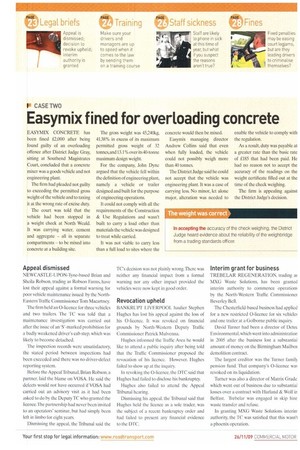IN CASE TWO
Page 23

If you've noticed an error in this article please click here to report it so we can fix it.
Easymix fined for overloading concrete
EASYMIX CONCRETE has been fined £2,000 after being found guilty of an overloading ffence after District Judge Gray, itting at Southend Magistrates
ourt, concluded that a concrete ll,,,
' er was a goods vehicle and not ngineering plant.
The firm had pleaded not guilty o exceeding the permitted gross eight of the vehicle and to taxing it at the wrong rate of excise duty.
The court was told that the vehicle had been stopped in a weight check at North Weald. It was carrying water, cement and aggregate — all in separate compartments — to be mixed into concrete at a building site. The gross weight was 45,240kg, 41.38% in excess of its maximum permitted gross weight of 32 tonnes,and 13.1% over itS 40-tonne maximum design weight.
For the company, John Dyne argued that the vehicle fell within the definition of engineering plant, namely a vehicle or trailer designed and built for the purpose of engineering operations.
It could not comply with all the requirements of the Construction & Use Regulations and wasn't built to carry a load other than materials the vehicle was designed to treat while carried.
It was not viable to carry less than a full load to sites where the concrete would then be mixed.
Easymix managing director Andrew Collins said that even when fully loaded, the vehicle could not possibly weigh more than 40 tonnes, The District Judge said he could not accept that the vehicle was engineering plant. It was a case of carrying less. No minor, let alone major, alteration was needed to enable the vehicle to comply with the regulation.
As a result, duty was payable at a greater rate than the basic rate of /185 that had been paid. He had no reason not to accept the accuracy of the readings on the weight certificate filled out at the time of the check weighing.
The firm is appealing against the District Judge's decision.
The weight was correct
In accepting the accuracy of the check weighing, the District Judge heard evidence about the reliability of the weighbridge from a trading standards officer.








































































































































